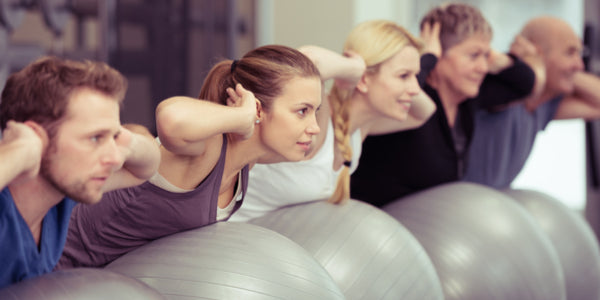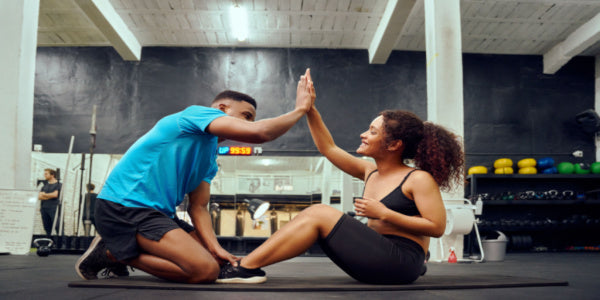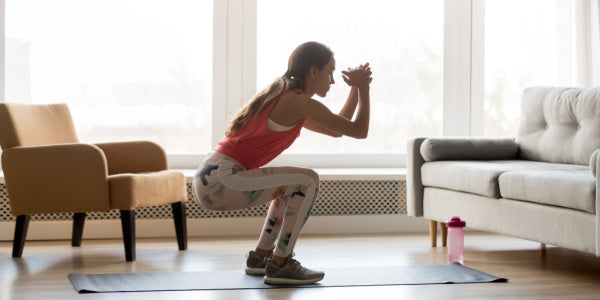
According to a recent report, knowing the benefit of exercise may be the first step for getting active.
The Australian research found participants were significantly more active when they correctly identified more diseases associated with physical inactivity.
So since knowledge is power, and maybe the first step to an active lifestyle, appreciating these 11 benefits of exercise may help lend happier, healthier, and longer lives.
The 11 Health Benefits of Exercising
1. Exercise Can Support Weight Loss and Management
There is a strong link between obesity and sedentary lifestyles, which places greater risk of developing chronic health conditions such as heart disease.
Especially with the combination of aerobic exercise and strength training, exercise can lead to long-term, sustainable weight loss.
But remember, weight loss occurs 90 percent of the time in the kitchen and you cannot outrun a poor diet.
2. Exercise Can Strengthen Bones and Muscles
Exercise plays an imperative role in strengthening bones and muscles, which is important throughout the entire lifespan.
Pairing resistance training and adequate protein is key to stimulate and grow muscle mass and strength as the body ages.
The National Institutes of Health (NIH) Osteoporosis and Related Bone Diseases National Resource Center positions the best exercise for your bones is the weight-bearing kind, which helps protect from bone loss to subsequently keep bones strong.
3. Exercise Can Make You Feel Good
Exercise is known to increase feelings of happiness by releasing feel-good endorphins, brain chemicals that enhance your sense of well-being, and distracting the mind from negative thoughts.
Such elevated feelings can in turn help reduce depression and anxiety, with the Anxiety and Depression Association of America even suggesting a quick 10-minute walk may be just as effective a 45-minute workout!
Some studies likewise indicate exercise can work quickly to elevate depressed mood, with evidence linking physically active people to lower rates of anxiety and depression compared to those living a sedentary lifestyle.
Research published in Neuropsychiatric Disease and Treatment also shows physical activity has can positively impact self-esteem, perceived personal fitness, and body image.
4. Exercise Can Lead to Smoke Cessation
Cigarettes are quite the threat and undeniably harmful to health – they increase the risk of lung disease and cancer, along with shaving off precious years of life. In fact, the CDC reports overall mortality (or death) of smokers is three times higher among people who have never smoked!
Smokefree.gov encourages that exercise can be a beneficial component of a smoke cessation plan.
Exercise helps distract the mind and keeps you busy until cravings pass. Even more so, withdrawal symptoms and cravings for cigarettes is said to decrease during exercise and up to 50 minutes after exercising.
Exercising also helps decrease appetite and limit weight gain some struggle with when they stop smoking.
5. Exercise Can Bolster Cognitive Processes
Regular exercise shows to be a key strategy for bolstering various cognitive processes, including memory, concentration, and creativity.
Exercise stimulates brain regions that are involved in memory function to release a chemical called brain-derived neurotrophic factor (BDNF), which rewires memory circuits to improve their efficiency according to Harvard Health.
Even the mere act of walking also improve creativity, which is the ability to create new ideas or solve problems in innovative ways.
6. Exercise Can Stave Against Chronic Diseases
Dismissing a sedentary lifestyle and increasing physical activity staves against numerous chronic disease states.
There is a strong pool of evidence proving exercise staves against type 2 diabetes, heart disease, certain forms of cancer, and dementia, just to name a few.
7. Exercise Can Amplify Skin Health
While some of the most recognized benefits of physical activity lie in the body’s internal organs and cells, exercise can also improve the external appearance and health of the skin.
Exercise improves skin health by increasing blood and oxygen flow, which helps nourish the skin cells and provide a natural glow. Toning up muscles further improves overall firmness of the skin.
The benefit of exercise on skin health also lies in its ability to combat against stress, which can initiate and exacerbate acne, eczema, psoriasis, rosacea, and other skin conditions.
8. Exercise Can Improve Sleep
Physical activity improves sleep quality and increases sleep duration, the National Sleep Foundation suggests.
Mostly, regular exercise can reduce stress and tire out the body, allowing with resetting the sleep-wake cycle, especially in early morning and afternoon exercises.
9. Exercise Can Enrich Social Connections and Relationships
Isolation can negatively impact health on physical and emotional levels. Exercise can increase socialization, particularly in the group workout settings and when utilizing the workout buddy system.
Research published in the Journal of Sports Economics backs subjects exposed to physical activity exhibit more trust and prosocial behaviors than those who are not exposed.
Exercise also helps improve sexual health in both women and men, which can be important in relationships.
10. Exercise Can Reduce PMS Symptoms
Premenstrual syndrome (PMS) is a combination of physical, psychological, or behavioral changes that occurs days leading up to menstrual cycles. PMS causes a number of unpleasant symptoms, including mood swings, bloating, tender breasts, food cravings, fatigue, irritability, and depression.
As the condition is not fully understood, making lifestyle changes can help ease associated symptoms, exercise included.
A 2018 study found eight weeks of aerobic exercise is effective in reducing the symptoms of PMS and can be used as a viable treatment option.
11. Exercise Can Help You Live Longer
According to a recent study published in the Annals of Internal Medicine, comes down to dismissing a sedentary lifestyle and taking a stand.
The research shows couch potatoes increase their risk of early death, though even short bouts of movement throughout the day may just extend precious years of life!
Research published in JAMA Internal Medicine shows individuals who meet the Physical Activity Guidelines for Americans minimum by either moderate- or vigorous-intensity activities reap nearly the maximum longevity benefit.
More specifically, they found men and women have a 20 percent reduced risk of dying prematurely compared to those doing less than or none at all of the recommendations, while those performing twice the minimum decrease their risk by 31 percent.
Maximizing Exercising Benefits
There is no denying the benefits of working out are extensive, compelling, and motivating. But how much is warranted? Interestingly, going past the threshold may not always be more advantageous.
A study published in Mayo Clinic Proceedings examined whether or not there were consequences of overtraining. The researchers found individuals who participated in three times the recommended physical activity guidelines over a 25-year timespan had a higher likelihood of developing coronary subclinical atherosclerosis before reaching middle age!
Overtraining can also increase the risk of fatigue-overtraining syndrome, a condition caused by overuse and damage to the muscle cells following rigorous exercise.
How Much Exercise Is Recommended?
To find balance the balance in exercise, the American Heart Association encourages the following:
• Participate in at least 150 minutes of aerobic exercise each week, breaking down to 30 minutes of physical activity five out of the seven days.
• Strength training at least two to three times weekly and focus on the major muscle groups, including the back, chest, arms, and legs.
Ultimately, though, some movement is better than no movement! Parking far away from the entrances, taking the steps over the elevator, and walking the dog around the neighborhood are simple ways to increase activity throughout the day.
And especially if managing a health condition, check with your doctor before starting any sort of workout regimen. They can further help you devise a safe plan to reap the benefits of exercising.







